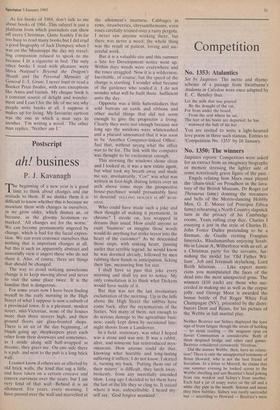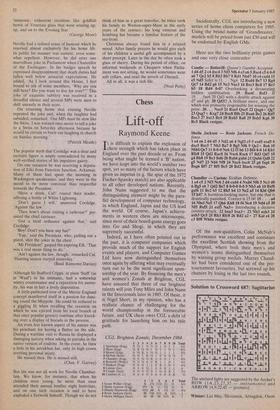No. 1350: The winners
Jaspistos reports: Competitors were asked for an extract from an imaginary biography or memoir stressing the lighter side of some notoriously grave figure of the past.
Engels relating how Marx once played the 'chain-trick' on Proudhon in the lava- tory of the British Museum, Dr Roget (of Thesaurus fame) donning the streamers and bells of the Morris-dancing Hobbly Men, G. E. Moore (of Principia Ethica fame) rehearsing a North Country slapstick turn in the privacy of his Cambridge rooms, Yeats rolling crap dice, Charles I essaying a jest in the style of Charles II, John Foster Dulles pretending to be a fireman, de Gaulle reciting Franglais limericks, Rhadamanthus enjoying Scrab- ble in Linear A, Wilberforce with an eel, at a Christmas party for the servants, fur- nishing the model for 'Old Father Wil- liam', Job and Jeremiah skylarking, Lord Reith hilarious. . . . Like expert morti- cians you manipulated the faces of the dead into the most unexpected grins. The winners (£10 each) are those who suc- ceeded in making me as well as the corpse jolly, and George Moor is awarded the bonus bottle of Pol Roger White Foil Champagne (NV), presented by the distri- butors Dent and Reuss, for his picture of the Webbs in full marital play.
Neither Beatrice nor Sidney displayed the least sign of brain fatigue though the strain of holding — let alone reading — the magnum opus on Soviet Communism is considerable. Both of them despised bridge and other card games. Beatrice considered crosswords 'frivolous.'
Did the mature Webbs, then, have no relaxa- tion? There is only the unsupported testimony of Brian Howard, who is not the best friend of Socialism. In a letter to Morrell, he claims that one summer evening he looked across to the Webbs' dwelling and saw Beatrice's head poking from one window and Sidney's from another. Each had a jar of soapy water on the sill and a white clay pipe in the mouth. Solemn and intent They blew bubbles. Sidney was rarely successful but — according to Howard — Beatrice's were 'immense, iridescent creations like goldfish bowls of Venetian glass that went soaring up, up, and on to the Evening Star.'
(George Moor) Neville had a refined sense of humour which he reserved almost exclusively for his home life. In public his manner was austere, even some- what repellent. However, he did utter one marvellous joke in Parliament when Chancellor of the Exchequer. In his budget speech he expressed disappointment that death duties had fallen well below actuarial expectations. He added, 'As I look around this House, I .feel bound to ask of some members, 'Why are you still here? Do you want to live for ever?" This joke of exquisite subtlety was received in a dreadful silence and several MPs were seen to shift uneasily in their seats.
On returning home that evening Neville repeated the joke and, when the laughter had subsided, remarked, 'Our MPs must be slow like the Swiss. I was warned once never to tell a joke to a Swiss on Saturday afternoon because he would be certain to burst out laughing in church on SUnday morning.'
(Patrick Meade) The popular myth that Coolidge was a dour and taciturn figure is amply contradicted by many well-verified stories of his impulsive gaiety.
On one occasion he was receiving a deputa- tion of Elks from Function Junction, Arkansas. Many of them had spent the morning in Washington speakeasies, and they were in the mood to be more convivial than respectful towards the President.
'Have a drink, Cal!' roared their leader, offering a bottle of White Lightning.
'Don't guess I will,' answered Coolidge. 'Against the law.'
'Then how's about visiting a cathouse?' per- sisted the chief carouser.
'Got a local ordnance against that,' said Coolidge.
'Boy! Don't you have any fun?'
'Yup,' said the President, who, pulling out a pistol, shot the joker in the chest.
`Mr President!' gasped the expiring Elk, 'That was a real mean thing to do.'
'Ain't against the law, though,' remarked Cal. 'Hunting season started yesterday.'
• (Basil Ransome-Davies) Although Sir Stafford Cripps, or plain 'Staff' (as in 'Waaf) to his intimates, had a somewhat wintry countenance and a reputation for auster- ity, his was in fact a lively disposition.
A little-publicised love of the Merrie England concept manifested itself in a passion for danc- ing round the Maypole. He could be reduced to a giggling fit when recalling the occasion on which he was ejected from his local branch of that once popular grocery combine after knock- ing over a display of biscuits in the process.
An even less known aspect of his nature was his penchant for having a flutter on the side. During a wartime visit to Russia he displayed a damaging naivety when asking to partake in the native version of roulette. In the event, he blew a hole in his astrakhan hat, only its high crown averting personal injury.
He missed then. He is missed still.
(Chas. F. Garvey) But life was not all work for Neville Chamber- lain. We know, for instance, that when his children were young, he more than once attended their annual bonfire night festivities, , and on one such occasion is said to have exploded a firework himself. Though we do not think of him as a great traveller, he twice took his family to Weston-super-Mare in the early years of the century; his long raincoat and homburg hat became a familiar feature of the sea-front.
Christmas always found him in a relaxed mood. After family prayers he would give each of his children a useful gift accompanied by a short precept. Later in the day he often took a glass of sherry. During his period of office, on informal weekends at Chequers when Parlia- ment was not sitting, he would sometimes wear soft collars, and read the novels of Disraeli.
All in all, it was a rich life. (Noel Petty)







































 Previous page
Previous page